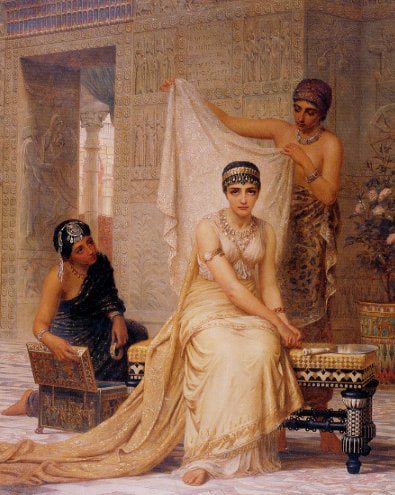|
Humility is the key that opens the door to favor. This is so vibrantly demonstrated in the story of Queen Esther. Her entire life was laid down to honor God. As an orphan she was raised by her cousin Mordecai. Together, they were carried into exile from Jerusalem to the citadel of Susa, located in the Persian empire. Today this territory is in southwestern Iran. Esther's true Hebrew name was Hadassah, meaning myrtle. This low-growing tree can be found in high places. Like the meaning of her true name, Hadassah was moved from her lowly surroundings to the high place of the king's palace where she was groomed, along with other beautiful women from the kingdom, as a possible queen for King Xerxes. She took on the Persian name of Esther (meaning star) to conceal her Jewish identity.
Hadassah submitted herself to Hegai, the head of the king's harem. For one year she was refined with beauty treatments of perfumes, cosmetics and the oil of myrrh (an oil used to prepare bodies and representing purification and dying to self). At the completion of her time with the harem, Hadassah would be taken to the king's palace to spend one night with him. Afterward she would take up residence with the king's concubines and would not see him again unless summoned by name. Can you imagine how Hadassah must have felt with all that she faced? And yet, she was cooperative and loving so that she won the favor of those who cared for her. Hadassah was a perfect picture of her Hebrew name and blossomed while preparing for one night with the King. It is interesting to note that the flowers on the myrtle tree are white (representing purity) with purple borders (representing royalty) and are extremely fragrant. This humble woman of God was crushed to produce a sweet fragrance. She was destined to win the king's favor and became Queen Esther, the star! She rose to a high place in the kingdom of King Xerxes through her beautiful humility. In the outskirts of the palace, at the king's gate, Esther's loyal caregiver, Mordecai, kept vigil. She was in regular contact with Mordecai and continued to follow his instructions. During her tenure as queen, King Xerxes appointed a man named Haman to a position higher than all the other nobles in the kingdom. He was an Agagite, a descendant of Agag who was an enemy of Saul and the nation of Israel. Isn't it fascinating that Mordecai was from the tribe of Benjamin like Saul? The ancient battle between the Jews and Agagites was renewed. Mordecai refused to kneel down to Haman. In a fit of anger, Haman decided to kill Mordecai and all the Jews in the kingdom on a set date. They "cast the pur" (lot) to select the 12th month (Adar) and the 13th day on the Hebrew calendar, and a decree explaining this edict was sent to all the provinces. Can you see how God positioned Esther for "such a time as this?" She proved her faithfulness to Him. Once again, she would need to take up a position of humility and die to self in order to save her people. She was asked to petition the king and plead for mercy for the Jews. Esther would be risking her very life by revealing her heritage as a Jew and by approaching the king without being summoned. She agreed to approach the king in the inner court and gave Mordecai the following instructions: "Go, gather together all the Jews who are in Susa, and fast for me. Do not eat or drink for three days, night or day. I and my maids will fast as you do. When this is done, I will go to the king, even though it is against the law. And if I perish, I perish." (Esther 4:16) Esther prepared for her assignment by humbling herself before God. She needed His favor more than anything else. I wonder if she knew that her Persian name was a prophetic sign for her life. This wise and brave woman would "shine like the brightness of the heavens" (Daniel 12:3) as she laid down her life to become a light in the darkness to save the Jews. The day set aside to annihilate the Jews became a day of celebration called Purim. King Xerxes extended his gold scepter to Esther. Haman's evil plot was exposed, and he was put to death. The days meant for slaughter became days of victory for the Jews. A decree was written: "...And these days of Purim should never cease to be celebrated by the Jews, nor should the memory of them die out among their descendants." (Esther 9:28) We have much to learn from Hadassah/Esther. Humility brings the favor of the King of kings and leads us to a shining victory! |
Joan E. MathiasCategories
All
Archives
July 2024
|

 RSS Feed
RSS Feed